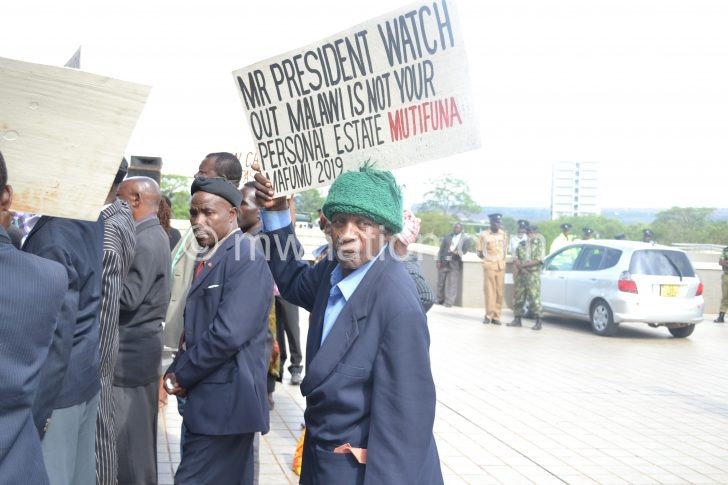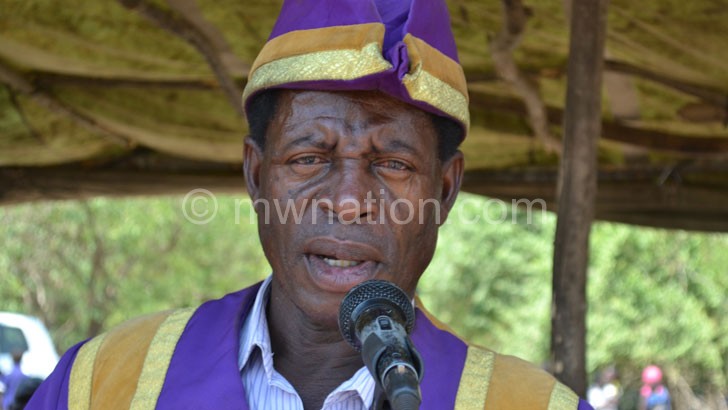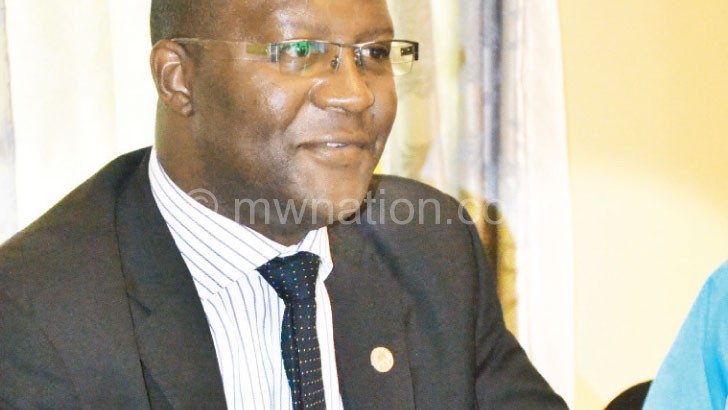Chiefs on each others’ throats
Leading chiefs in the land debate are on each others’ throats with counter-accusations of political posturing and pocketing of bribes to take particular narratives on the issue.
Anti-land laws traditional leaders such as senior chiefs Kabunduli of Nkhata Bay and Chikowi of Zomba have accused fellow traditional leaders supporting the new laws of pocketing bribes from the State machinery.
But proponents of the law, including paramount chiefs Lundu of Chikwawa and Lukwa of Kasungu, have hit back, saying chiefs rejecting the new law are being used by opposition political parties to stir trouble.
That is how divisive the recently-enacted Land-related laws—especially the Principal Land Act and Customary Land Bills of 2016 among the four-pack that President Peter Mutharika assented to in September this year—have become.
At the heart of the matter is the laws’ removal of traditional leaders as sole administrators of land.
Instead, the new laws designate chiefs as chairpersons of Land Committees mandated to administer customary land

The chiefs opposing the new laws have since warned that if Capital Hill does not review the laws, the ruling Democratic Progressive Party (DPP) administration will pay the ultimate price at the polls in 2019 elections.
Some of the chiefs who are resisting the introduction of the new laws said in random interviews that government should expect non-compliance from traditional leaders on the new land law, claiming their views were not taken into account when drafting the new land administration-related Bills.
In an interview on Tuesday, Senior Chief Chikowi of Zomba described the new land laws as “unfriendly” to rural-based poor Malawians.

She said: “As chiefs, we were asked to provide our input to the draft Bills, but at the end of the day our concerns such as our stand to keep customary land in the hands of chiefs were not addressed. As I am speaking now, my subjects have put their foot down that they will not comply with the dictates of these new laws.”
“People in the villages are too poor to afford food and now the government expects them to buy [or lease] their own land. This is very disheartening that the government seems adamant on punishing its own people.”
But our review of the laws does not show provision which shows that local people will have to buy their land.
Rather, those that want to register their land will pay a small a fee once registered, the land will be private and it will be called Customary Estate.
The law defines Customary Estate as land which is owned, held, or occupied as private land within a Traditional Land Management Area and is registered as such under the Registered Land Act.
The Zomba royal’s sentiments were shared by outspoken Senior Chief Kabunduli of Nkhata Bay who in a telephone interview on Tuesday accused fellow chiefs championing the new laws of being bribed by the State machinery to paint a rosy picture.
He also accused government of lying that it consulted chiefs on the legal reforms.
Kabunduli said: “As far as I am concerned, there were no consultations. If that was the case in Nkhata Bay, I would have known because I am the most senior ranked traditional leader here. As chiefs, we believe that land is the basis of any chieftaincy as such depriving us of land is the same as dethroning us.”
“I can assure you that if government does not review this law, it will mark the end of this administration during the next election because chiefs and our people are very angry at the turn of events.”
The two chiefs’ concerns follow the Mzimba Heritage Association (Mziha) who also refused to be subjected to the new law, saying it deprives traditional leaders of authority over customary land.
In a telephone interview on Monday, however, Inkosi ya Makosi Mmbelwa V,—who reigns over Mzimba—refused to comment on whether chiefs were consulted or not, saying: “I was not yet on the throne when this [Act] started, so I cannot say I have knowledge of the so-called consultations.”
Paramount Chief Lundu of Chikwawa, whos supports the Land law, who admitted divisions among traditional leaders in the country over the new land laws, said consultations were done.
Lundu said: “Government held consultations with chiefs. Some paramount chiefs, including myself, Kyungu, Kachindamoto and Lukwa, were taken to Zambia, Tanzania and Mozambique to appreciate how similar laws are working.
“We are surprised that even some chiefs that were part of us have turned around. I know these chiefs have been sent by the opposition and next time I will mention their names.”
He said all the relevant issues, including giving women access to land, were addressed.
Paramount Chief Lukwa of Kasungu said chiefs who have ganged up against the law are ‘misguided.’
Said Lukwa: “We had problems with the laws at first but we negotiated. The land tribunals that are being created through the new laws will include three women at every level. But also the new law has given value to land by sorting out the issue of compensation. So, if some are against it, it is because some shrewd politicians are cheating them but I acknowledge that there has not been enough sensitisation on the matter.”
There are 10 land-related laws which, since 1996, government has been reviewing. .
The expected outcomes of such reviews were that the whole country would be a planning area and all land administration and management functions shall be decentralised to councils.
The review also envisioned the establishment of land tribunals and land village committees where women shall constitute over 50 percent of the composition of the committee; and formalisation of Traditional Leader’s roles in land administration and management functions to make the process democratic and transparent.
In August this year, Parliament passed four of these 10 land-related laws. This was after the then president Joyce Banda refused to assent to these laws after Parliament passed them in 2013.
The four enacted laws are: Land Bill (Principal Land Bill), Physical Planning Bill, Land Survey Bill; and Customary Land Bill. President Mutharika assented to them in September.
In the sitting currently underway, Parliament has, again, passed the remaining six. They are: The Registered Land (Amendment) Bill; The Lands Acquisition Bill; The Local Government (Amendment) Bill; The Public Roads (Amendment) Bill; The Malawi Housing Corporation (Amendment) Bill; and the Forest (Amendment) Bill. The President has not yet assented to these Bills.
The recent passing of the additional Bills has reignited controversy over land laws.
Last week, some chiefs and other interest groups, including Thyolo-based land activist Vincent Wandale, petitioned the Speaker of Parliament to express their anger over laws they say were enacted without taking people’s input.
Supporters of the law point to, among others, the 2010 Law Commission Report on the review of the land-related laws, signed by Peter Mutharika while Minister of Justice, and Constitutional Affairs, which shows that the 19-member Special Commission that produced it, had a representation of all sectors of the society, including traditional leaders and Senior Chief Kanyenda from Nkhotakota represented the chiefs.
The grey areas
Lawyer Gracian Banda, who specialises in land issues, says the traditional leaders and those opposing the laws have legitimate concerns.
Explained Banda: “I believe there are genuine concerns that have not been addressed by the land laws that have just been enacted. In particular, the land laws have not addressed issues of access to land by Malawians in general and vulnerable groups in particular. The land laws have left intact the skewed distribution of land in the hands of the rich.
Banda added that the 2016 Customary Land Act has created Traditional Land Management Areas which strengthens traditional authority’s control over customary land.
However, each person or family now holding customary land will be entitled to register their holding as customary estates.
“Once registered, such land will no longer be customary land, but will be private land governed [by the new Land Act]. As such traditional authorities will have no say over such land.”
Another land and legal expert Chikosa Silungwe, who was involved in drafting the land-related Bills, said on Thursday in an e-mail response that while the enactment of the new land-related legislation is a commendable step, the laws have left too many issues unattended to.
“It is important to note that land reform, let alone land law reform, ought to be incremental. There are a number of issues that remain such as the issue of joint titling for spouses which has been raised by the women lobby; the issue of sectional titling; the need to develop a comprehensive landlord and tenant law.”
But Silungwe insists that the position held by some chiefs who are opposing the law has been clarified under the Land Act 2016.
Minister of Lands Atupele Muluzi on Tuesday in an e-mailed response, acknowledged the controversy the land law issue has created, but fell short of pointing out specific steps government will take to address the concerns raised.





